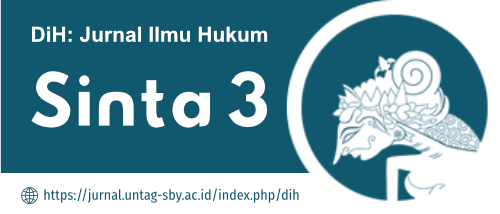BANTUAN HUKUM KELOMPOK RENTAN
DOI:
https://doi.org/10.30996/dih.v16i1.3045Keywords:
bantuan hukum, kelompok rentanAbstract
Women, children and vulnerable groups are marginalized groups that have many injustice problems especially related with gender. Among them are juducial access difficulties, overty, lack of information, legal illiteracy and others. At present the vulnerable groups have difficulty accessing legal assistance because they are pover and have not been recognized even they cannot be proven because they are not included in the State overty data. Related to this, writer examine the problems and concepts of legal aid for marginalized groups. The results of this sturdy indicate that there is difficulties in accessing legal aid because indonesai still have legal aid bades on economic condition, while other conditions of vulnerability have not been accommodated. Legal aids concept must be transformative to reach all of vulnerable groups regardless of gender status but accommodates vulnerability due to patriarchal system and sosial conflicts.
Perempuan, anak dan kelompok rentan adalah kelompok yang termarginalkan dan mengalami banyak problematika ketidakadilan gender. Diantaranya adalah kesulitan akses yudisial, kemiskinan, lack of information, buta hukum dan masih banyak lainnya. Saat ini kelompok rentan kesulitan mengakses bantuan hukum karena kondisi miskinnya belum terakui bahkan tidak bisa dibuktikan karena tidak masuk dalam data kemiskinan Negara. Terkait hal tersebut penulis meneliti tentang problematika dan konsep bantuan hukum bagi kelompok marginal. Adapun hasil penelitian menunjukan adanya kesulitan kases bantuan hukum bagi kelompok rentan karena selama ini bantuan hukum masih berbasis ekonomi atau kondisi ekonomi atau kemiskinan, sedangkan kondiosi kerentanan lainnya belum terakomodir. Konsep bantuan hukum bagi kelompok rentan sedianya bersifat transformatif yaitu menjangkau semua lampiran tanpa memandang status jenis kelamin, namun mengakomodir kerentanan karena sistem patriarki dan konflik sosial.
Downloads
References
Beatrix Salamor Yonna, ‘Pemberian Bantuan Hukum Pada Masyarakat Miskin Kota Ambon’, Jurnal Muara, 2 (2018)
‘Inilah Jumlah Kekerasan Pada Perempuan Di Jatim, Sudah Peka Kah Kamu?’, 2019
Instruksi Menteri Kehakiman RI Nomor: M. 08-UM.06.02 Tahun 1992 Tanggal 26 Agustus 1992.
Jack Donnelly, Human Rights, Individual Rights, and Collective Rights, 40AD
Prasetyo, Teguh, Hukum Dan Sistem Hukum Berdasarkan Pancasila (Yogyakarta: Media Per-kasa, 2013)
Raharjo, Agus, ‘Akses Keadilan Bagi Rakyat Miskin (Dilema Dalam Pemberian Bantuan Hu-kum Oleh Advokat)’, Jurnal Mimbar Hukum, 27 (2015)
Ramly Hutabarat, Persamaan Di Hadapan Hukum (Equality Before The Law) Di Indonesia (Jakarta, 1985)
Rodiyah, ‘Model Pemberdayaan Kelompok Rentan KDRT Berbasis Need Asssesment Dalam Perspektif Hukum’, Jurnal Pandecta, 7 (2012)
Sunggono, Bambang, and Aries Harianto, Bantuan Hukum Dan Hak Asasi Manusia (Bandung: Mandar Maju, 1994)
Downloads
Published
Issue
Section
License
Authors who publish with DiH: Jurnal Ilmu Hukum agree to the following terms:
- Authors transfer the copyright and grant the journal right of first publication with the work simultaneously licensed under a CC BY-SA 4.0 that allows others to share the work with an acknowledgement of the work's authorship and initial publication in this journal.
- Authors are able to enter into separate, additional contractual arrangements for the non-exclusive distribution of the journal's published version of the work (e.g., post it to an institutional repository or publish it in a book), with an acknowledgement of its initial publication in this journal.
- Authors are permitted and encouraged to post their work online (e.g., in institutional repositories or on their website) prior to and during the submission process, as it can lead to productive exchanges, as well as earlier and greater citation of published work (See The Effect of Open Access)










